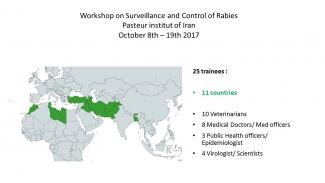
This 11-day on-site course is organized by the Pasteur Institute of Iran with the support of the Institut Pasteur in Paris, the Department of Biochemistry, of the University of Lausanne, Switzerland, the Health Sciences eTraining Foundation (HSeT), the World Health Organization (WHO) and the PREDEMICS consortium (FP7 grant nb 278433) in collaboration with the World Organization for Animal Health (OIE), the Food and Agriculture Organization of the United Nations (FAO) and the Global Alliance for Rabies Control (GARC). This course is the fourth edition in a series that have been organized in Dakar, Senegal in 2013 (http://www.who.int/bulletin/volumes/93/7/14-149849/en/), in Phnom Penh, Cambodia, in 2015 and in Yaoundé, Cameroon in 2016.
Training objectives:
- To increase awareness and communication about rabies in Middle East and Central Asia.
- To identify gaps and discuss opportunities for rabies control and elimination in Middle East and Central Asia and elaborate on strategic and practical solutions.
- To improve knowledge and practice on rabies epidemiological data in particular rabies incidence.
- To discuss the present situation of rabies prophylaxis in humans and propose practical solutions to increase access to post-exposure prophylaxis.
- To increase knowledge on dog rabies vaccination and other approaches for dog population management.
- To create an inter-sectorial regional rabies network and to promote one health approach and dog vaccination to control rabies in Middle East and Central Asia
This course will take advantage of the new possibilities offered by e-Learning and already existing documents from WHO, OIE, GARC, other international organizations and networks. A pre-training assessment tool will be provided to select applicants and prepare trainees to participate actively in discussions and practical activities during the workshop. To complete this pre-training session, applicants will require approximately 70 hours of personnel work during two months. The trainees will have access to these functionalities through a dedicated webpage. The on-site course (11 days) will focus on practical sessions, such as bench work, demonstrations and hands-on sessions, which will complement the theoretical part (pre-training session and lectures). The course will be held in Iran. The successful trainees will benefit from 8 ECTS (European Credits Transfer System) of the University of Lausanne, Switzerland.
